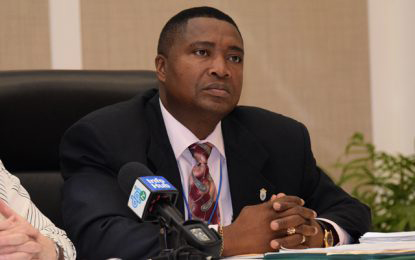Permanent Secretary (PS) of the Department of Public Service, Reginald Brotherson, on Friday said that in the absence of a constituted Police Service Commission (PSC), the authorised minister or agency can take action against police ranks using the Public Service Rules.
His comments on the matter come one day after Minister of Citizenship Winston Felix disclosed that former SWAT Unit head Motie Dookie, was sent on special leave with full pay in accordance with the 1987 Public Service Rules.
The legality of this decision has since been challenged. Former Attorney General Anil Nandlall has said that this decision is not in keeping with the law, while pointing out that in the absence of a constituted PSC, which is responsible for disciplinary action against senior police ranks, Dookie should have remained on the job.
The decision to send Dookie on special leave was made while Felix was performing the functions of Public Security Minister. At the time, the substantive Minister, Khemraj Ramjattan, was abroad on official duties.
Felix, on Thursday, quoted Rule H33 under Section H of the Public Service Rules, which deals with special leave on the ground of public interest, to defend the legality of the decision made. It states, “Special leave with full pay on the ground of public interest may, with the approval of the Permanent Secretary, Public Service Ministry, be granted to a public servant upon the recommendation of the Permanent Secretary/ Head of Department/Regional Executive Officer.”
When contacted on Friday, Brotherson made it clear that he cannot “give permission” as the remit of the police doesn’t fall under him. He, however, related that consultations have always taken place on these types of matters. He said that the Department would not “recommend”, but would give guidance and share information.
The PS explained that in circumstances where there is no Judicial Service Commission or PSC, “the authorized minister or agency will have to act, and in acting, they will consult or use information from the Public Service Rules or the constitution or whatever to legitimise their actions”. But Brotherson stressed that in the absence of a constituted PSC, a person can be sent on leave in the public interest.
“Basically that’s it. If there is no JSC, there is no Police Service Commission, what do you do?” he asked.
He insisted that no wrongdoing was committed in sending Dookie on special leave. “It is all legal, very, very legal. If there was a Police Service Commission they would have had to deal with it immediately,” Brotherson stated.
In a statement issued on May 27th, Nandlall said that the only authority vested with the power to make a decision such as that is the Police Service Commission. The life of that commission came to an end last August and a list of nominees is currently before the National Assembly awaiting approval.
Nandlall, in his statement, had said that whatever wrong Dookie is accused of, at a minimum, he is entitled to due process and protection under the law. He noted that Dookie holds the rank of Deputy Superintendent of Police.
“It is now public knowledge that Minister Winston Felix, acting for Minister of Public Security, Khemraj Ramjattan, directed the Commissioner of Police (ag.) David Ramnarine, to remove Dookie as head of the SWAT Unit and send him on `special leave in the public’s interest’”, the statement said.
“Minister Felix, nor Minister Ramjattan, nor even the President, has any lawful authority to give such directions to the Commissioner of Police, nor do they have any authority whatsoever, over the employment, dismissal or discipline of Officer Dookie. The Constitution places that functional remit exclusively in the Police Service Commission. Article 212 of the Constitution provides that ‘…the power to make appointments to any offices in the Police Force of or above the rank of inspector, the power to exercise disciplinary control [of] persons holding or acting in such offices and the power to remove such persons from office shall vest in the Police Service Commission,’ the release continued.
“Clearly, Dookie falls within the ranks provided for and contemplated by this provision. Additionally, Article 226 (1) provides that ‘…in the exercise of its functions under this Constitution, a Commission shall not be subject to the direction or control of any other person or authority,’” Nandlall had argued.
Nandlall had said that the illegality of this case is compounded by the fact that Dookie was not even heard before being imposed with the sanctions.
Dookie, who was accused of smuggling 30 cases of whisky in December last year, was spared of criminal charges after the driver of the vehicle that he was in at the time of the interception took full responsibility.
He was relieved of his duties as Commander and temporarily transferred to the force’s Strategic Planning Unit to facilitate an internal investigation. In a surprise move, he was posted to the Police ‘A’ Division last month but reassigned to Police Headquarters, Eve Leary a few days later. On May 24th, the decision to send him on special leave was made.






